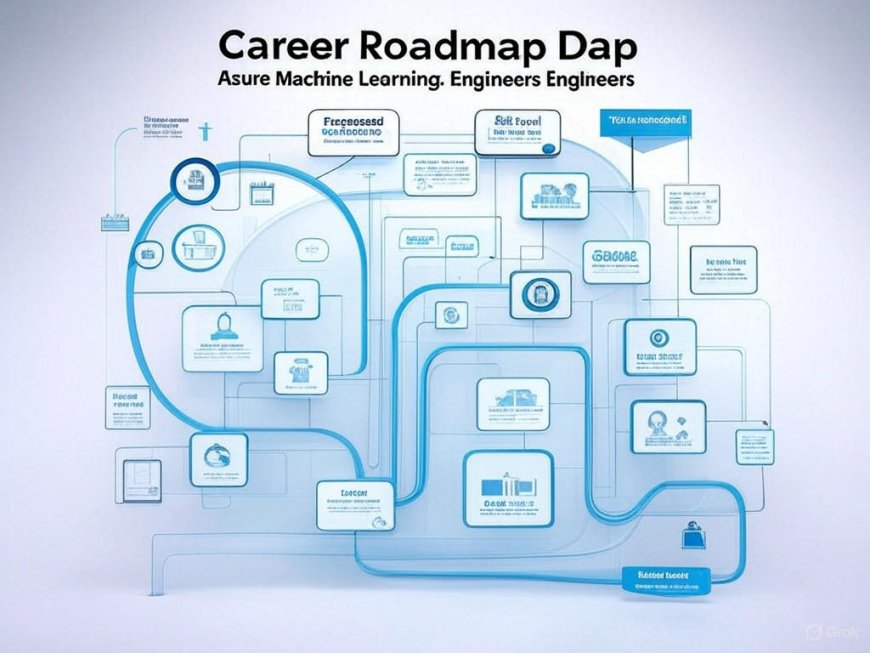Career Roadmap for Azure Machine Learning Engineers: A Comprehensive Guide

Introduction
Embarking on a career roadmap for Azure Machine Learning Engineers is an exciting journey filled with opportunities for growth and innovation. As the demand for skilled professionals in machine learning continues to rise, understanding the path to becoming an Azure Machine Learning Engineer is crucial. This guide will provide you with a detailed roadmap, covering essential skills, certifications, and career progression tips.
Before diving into the roadmap, it's essential to understand the foundational knowledge required. Familiarizing yourself with azure ml certification can provide a solid starting point. Additionally, gaining insights into azure active directory interview questions can be beneficial as you prepare for interviews and practical applications.
Understanding the Role of an Azure Machine Learning Engineer
Core Responsibilities
Azure Machine Learning Engineers are responsible for designing, implementing, and deploying machine learning models using Azure's robust suite of tools. Their core responsibilities include:
-
Data Preparation: Cleaning and preprocessing data to ensure it is suitable for machine learning models.
-
Model Training: Developing and training machine learning models using Azure Machine Learning services.
-
Model Deployment: Deploying trained models into production environments.
-
Monitoring and Maintenance: Continuously monitoring model performance and making necessary adjustments.
Skills and Competencies
To excel in this role, you need a blend of technical and soft skills:
-
Technical Skills: Proficiency in Python, experience with Azure Machine Learning Studio, knowledge of data preprocessing techniques, and familiarity with cloud computing.
-
Soft Skills: Strong problem-solving abilities, effective communication, and teamwork.
Educational Background and Certifications
Educational Pathways
A strong educational foundation is crucial for a successful career in machine learning. Most Azure Machine Learning Engineers hold a bachelor's or master's degree in computer science, data science, or a related field. Coursework in statistics, mathematics, and computer programming is particularly beneficial.
Certifications
Obtaining relevant certifications can significantly enhance your credentials. Some of the most valued certifications include:
-
Microsoft Certified: Azure Data Scientist Associate: This certification validates your skills in applying machine learning techniques using Azure.
-
Microsoft Certified: Azure AI Engineer Associate: Focuses on building, training, and deploying AI models using Azure services.
Gaining Practical Experience
Internships and Entry-Level Positions
Gaining practical experience through internships and entry-level positions is invaluable. These opportunities allow you to apply theoretical knowledge in real-world scenarios, work with experienced professionals, and build a professional network.
Personal Projects
Undertaking personal projects can also demonstrate your skills and initiative. Consider working on projects that involve:
-
Data Analysis: Analyzing datasets to extract meaningful insights.
-
Model Development: Building and training machine learning models.
-
Deployment: Deploying models using Azure services.
Building a Professional Network
Joining Professional Organizations
Joining professional organizations such as the Association for Computing Machinery (ACM) or the Institute of Electrical and Electronics Engineers (IEEE) can provide networking opportunities, access to industry events, and resources for professional development.
Attending Conferences and Workshops
Attending industry conferences and workshops is an excellent way to stay updated on the latest trends and technologies in machine learning. Events like the Microsoft Ignite conference offer valuable insights and networking opportunities.
Career Progression
Entry-Level Positions
Starting as a Junior Machine Learning Engineer or Data Scientist, you will focus on learning the basics of machine learning, working under the supervision of experienced professionals, and contributing to smaller projects.
Mid-Level Positions
As you gain experience, you can progress to roles such as Machine Learning Engineer or Data Scientist. In these positions, you will take on more responsibility, lead projects, and mentor junior team members.
Senior-Level Positions
With significant experience, you can advance to senior roles such as Senior Machine Learning Engineer or AI Architect. These positions involve strategic decision-making, leading large-scale projects, and driving innovation within the organization.
Continuous Learning and Development
Staying Updated with Industry Trends
The field of machine learning is constantly evolving. Staying updated with the latest trends, tools, and technologies is crucial. Regularly reading industry publications, following thought leaders on social media, and participating in online courses can help you stay ahead.
Pursuing Advanced Degrees
Pursuing advanced degrees, such as a Ph.D. in Machine Learning or a related field, can open up opportunities for research and academic positions. Advanced degrees can also enhance your expertise and credibility in the field.
Conclusion
Embarking on a career roadmap for Azure Machine Learning Engineers is a rewarding journey that requires a blend of education, practical experience, and continuous learning. By following this comprehensive guide, you can navigate the path to becoming a successful Azure Machine Learning Engineer and make a significant impact in the field of machine learning.
FAQs
What is the role of an Azure Machine Learning Engineer?
An Azure Machine Learning Engineer is responsible for designing, implementing, and deploying machine learning models using Azure's suite of tools. Their core responsibilities include data preparation, model training, deployment, and monitoring.
What skills are required to become an Azure Machine Learning Engineer?
To become an Azure Machine Learning Engineer, you need a blend of technical and soft skills. Technical skills include proficiency in Python, experience with Azure Machine Learning Studio, and knowledge of data preprocessing techniques. Soft skills include strong problem-solving abilities, effective communication, and teamwork.
What educational background is needed for a career in Azure Machine Learning?
Most Azure Machine Learning Engineers hold a bachelor's or master's degree in computer science, data science, or a related field. Coursework in statistics, mathematics, and computer programming is particularly beneficial.
What certifications are valuable for Azure Machine Learning Engineers?
Valuable certifications for Azure Machine Learning Engineers include Microsoft Certified: Azure Data Scientist Associate and Microsoft Certified: Azure AI Engineer Associate. These certifications validate your skills in applying machine learning techniques using Azure.
How can I gain practical experience in Azure Machine Learning?
Gaining practical experience through internships, entry-level positions, and personal projects is invaluable. These opportunities allow you to apply theoretical knowledge in real-world scenarios, work with experienced professionals, and build a professional network.
What are the career progression opportunities for Azure Machine Learning Engineers?
Career progression for Azure Machine Learning Engineers typically starts with entry-level positions such as Junior Machine Learning Engineer or Data Scientist. With experience, you can progress to mid-level roles like Machine Learning Engineer or Data Scientist, and eventually advance to senior roles such as Senior Machine Learning Engineer or AI Architect.
How can I stay updated with the latest trends in machine learning?
Staying updated with the latest trends in machine learning involves regularly reading industry publications, following thought leaders on social media, and participating in online courses. Attending industry conferences and workshops is also an excellent way to stay informed.
What is the importance of building a professional network in this field?
Building a professional network is crucial for career growth in machine learning. Joining professional organizations, attending conferences, and participating in industry events can provide networking opportunities, access to resources, and insights into the latest trends and technologies.
What are some personal projects I can undertake to demonstrate my skills?
Personal projects that involve data analysis, model development, and deployment using Azure services can demonstrate your skills and initiative. Consider working on projects that showcase your ability to analyze datasets, build and train machine learning models, and deploy models using Azure.
What are the benefits of pursuing advanced degrees in machine learning?
Pursuing advanced degrees, such as a Ph.D. in Machine Learning or a related field, can open up opportunities for research and academic positions. Advanced degrees can also enhance your expertise and credibility in the field, making you a more competitive candidate for senior-level roles.




















































































